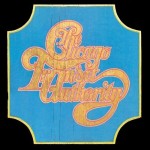Some records simply rank among the most highly influential in a person’s musical development and tastes. Chicago Transit Authority is one such album for me. And the fact it was released 40 years ago yesterday reinforces just how effin’ old I’m getting.
 One of the keys to formative albums is that they remain important to you even as you grow older. My views and impressions of CTA have changed and evolved over the four decades I’ve been listening to it. Yet it’s still an album I love listening to.
One of the keys to formative albums is that they remain important to you even as you grow older. My views and impressions of CTA have changed and evolved over the four decades I’ve been listening to it. Yet it’s still an album I love listening to.
For those of us playing in garage bands at the time, you weren’t diddly if you didn’t have a couple Chicago tunes in your repertoire. (After release of the album, the band switched its name to simply “Chicago,” reportedly when the “real” Chicago Transit Authority, the city’s mass transit entity, threatened to sue the band.) The band I played keyboards in (however poorly) had no less than three cuts from this debut album in its arsenal: “Does Anybody Really Know What Time It Is” (which we called “DARKWITS”, even though the acronym isn’t correct), “Beginnings” and “South California Purples.”
There were two things that really attracted me about the LP at the time. First, it was the horn section. It just seemed more focused and more of a solid unit than other bands incorporating that horn sound. The colors and intonations on the opening cut, “Introduction,” are exhibit one for the talent of that section. I also was a big fan of Bobby Lamm, the keyboard player. I loved the piano solo leading into DARKWITS, omitted from the radio edit. I used to pore over the complete sketch score I had of the album even though my music reading skills and pudgy hands guaranteed I was incapable of coming close to how Lamm played.
With repeated listening, I also developed a fascination with Peter Cetera’s bass playing. Although Cetera’s voice would later lead him and the band into songs I didn’t quite like, CTA leaves little doubt that Cetera was one hell of a bass player, providing a crucial drive to the rhythm section. Moreover, due in part to the brass section and guitarist Terry Kathy being tasked with both rhythm and lead guitar, Cetera’s bass would often move up front yet never buried the balance of the section. His style was never simplistic and he helped bring a cohesiveness to the band. He is too often overlooked as an excellent bassist.
Of course, like most, I was at first hooked on the the more mainstream, almost radio-ready songs. After all, the band had three vocalists who could sing lead and the album spent 171 weeks on the charts. In fact, the entire first side of the double LP set could be considered radio worthy. As the years went on, though, I listened even more closely to Terry Kath’s work. I firmly believe Kath is one of the greatest rock guitarists of all time. I’ll admit I’m not a fan of “Free Form Guitar,” which opened the second LP. But take a listen to “Liberation,” the 15-minute live in the studio instrumental jam that closes that second disc. Not only is Kath blistering, he’s doing it on a jam, not with overdubs and retakes. His talent borders on astounding.
Those are just some of the changes I’ve gone through with CTA. And there’s another one that’s just as important. With hindsight, I can see how the band’s arrangements and performances helped provide a foundation to appreciate and “understand” jazz when I was finally exposed to it. Would I have become a jazz fan without CTA? Perhaps, but I would have missed out on hundreds of enjoyable hours listening to this LP.
And don’t you put me down, please
For creating beyond your mind
I said all you got to do is listen
“Listen,” Chicago Transit Authority








Agreed….CTA is one of the classic albums that stand the test of time, much like “Who’s Next,” “Sgt Pepper,” and “Exile on Main Street.” Although Greenday came very close with “American Idiot.” Music can still turn a generation!